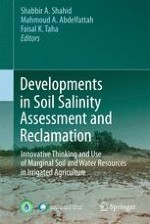2013 | OriginalPaper | Buchkapitel
23. Practical, Productive, and Environment-Friendly Utilization of Different Categories of Salt-Affected Soils in Arid and Semiarid Regions of Pakistan
verfasst von : Shafqat Farooq, M. Akram, M. Afzal, R. Arshad, Farooq Azam
Erschienen in: Developments in Soil Salinity Assessment and Reclamation
Verlag: Springer Netherlands
Aktivieren Sie unsere intelligente Suche, um passende Fachinhalte oder Patente zu finden.
Wählen Sie Textabschnitte aus um mit Künstlicher Intelligenz passenden Patente zu finden. powered by
Markieren Sie Textabschnitte, um KI-gestützt weitere passende Inhalte zu finden. powered by
